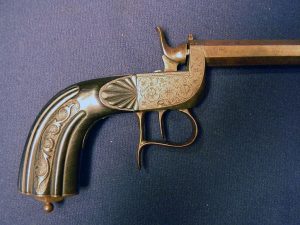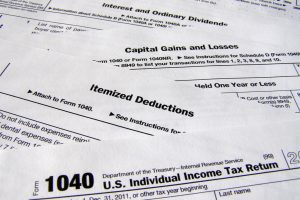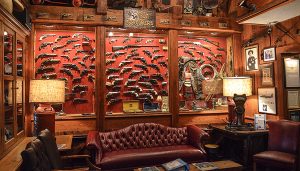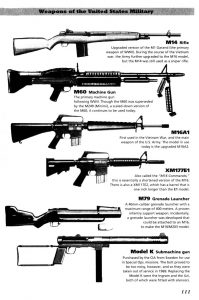
Collectors are always looking for the pot of gold at the end of the rainbow. They want the rarest of the rare, the one gun that they can’t live without. We’ve all heard the story about that Picasso in the attic. Does that happen with guns? The answer: it just might.
The Search
When you’re looking for the ultimate collectible, anything can happen. The best deals can pop up in the unlikeliest places. Unless you are a seasoned collector, be sure about the items you buy. Not everyone is out to cheat you, but know the basics. Knowing what’s authentic can save tens of thousands of dollars. Newbie collectors should be educated. Know which maker’s marks are pertinent to your weapon. Examine the provenance. Check to see if there have been modifications. If buying from a private seller, know state and federal laws. No one wants to buy a gun only to turn it over to law enforcement. Investing time in research can be the difference between going home with a Mercedes or a Yugo.

Places to Buy
Fellow Collectors
Gun collectors have their own community. Becoming a serious collector is made easier if you can find that community. Developing relationships within the group can be extremely beneficial. You can gain knowledge and get rare opportunities to buy guns before they go on the open market. Good friendships can form over common interests, but don’t be foolhardy. Even if you’re about to realize your lifelong dream of becoming the next Sgt. York, don’t buy that vintage Colt 1911 without an appraisal or before checking the provenance. It’s better to be safe than sorry.
Live Auctions
A tried and true way to buy collectibles is to attend a live auction. Each auction publishes a catalogue available to the public. It allows you to be able to browse the offerings beforehand. Each listing gives info on items for sale and makes it easier to decide what to buy. Reputable companies like Christie’s have been holding specialty auctions for more than a hundred years. Rare items may be easier to find, but can cost you. Auctions may be more expensive than buying privately, depending on the item being sold and the amount of interest. Don’t get caught up in auction fever and spend more than your bank account allows.
You may examine the merchandise if you attend the auction. That’s when knowledge is most important. If you have any questions, ask. There are sure to be experts everywhere that will help out.
Firearms auctions are usually advertised nationwide. Catalogues may be posted on the internet, giving you time to peruse before the event. If unable to attend the auction in person, you can bid as an absentee buyer. You may also be able to bid through an online service. An absentee bidder must have complete faith in the auctioneer, the process and the gun’s value. Due diligence can determine the reputation of the auctioneer and auction house before bidding.
Specialty Dealers
Looking for one specific item? A reputable specialty dealer may be your best bet. It also saves time if you don’t want to traverse gun shows or spend hours at auctions. A good dealer will have access to items gun shops may not. They also tend to be at the top of the list when a vintage piece or collection goes up for sale. Choose dealers with experience and a longstanding reputation. They tend to have the best connections and aren’t willing to risk their business by hoodwinking a potential customer.
Online
Buying online can be a blessing or a curse. Experienced collectors have been buying online for years. Some find it the easiest way to track down hard to find gems or rare collectibles. Buyers should be savvy to state and federal laws regarding the sale and purchase of firearms. A boon to the industry is that eBay prohibits the sale of firearms. That policy made way for several top sites to create their mark – GunsAmerica.com, GunAuction.com, and GunBroker.com to name a few.
Sadly, there are more disreputable dealers that reputable ones. Before buying, have direct contact with the gun owner. Do not work through a third party. Check references and ratings. Know the seller’s return policy and check out their ratings and references before laying down any money.
Online classified sites may offer opportunities to buy weapons. Seasoned collectors tend to avoid them or proceed with extreme caution.
Gun Shows
Collector shows aren’t as common as commercial shows, but they do exist. It’s a great way to meet like-minded individuals. You can see what other collectors and sellers have to offer. Chances are that you’ll get to see things you’ve never imagined. While you may not be able to buy, you’ll likely go home with a very long wish list.
Yard Sales
Yard sales often offer more than baby strollers and chipped dishes. People saddled with a garage full of boxes often put them out for sale. High end locations may offer valuable surprises.
Storage Lockers
Think buying a storage locker is a sure way to find treasure? Think again. Chances are you’ll end up with a pile of junk. Also, guns found in a storage locker must be turned over to authorities. Save your money and your time.
Estate Sales
Estate sales can be gold mines. Check published listings of items to be sold. Listings aren’t often too specific, but rare gems can be found. Stay until the end and you could walk away a winner.
No matter which path you choose, be smart. Learn to do your own appraisals to save time, money and heartache. If that’s not an option, develop a relationship with an antique rifle appraiser. You’ll always have someone that can be trusted to steer you in the right direction.




